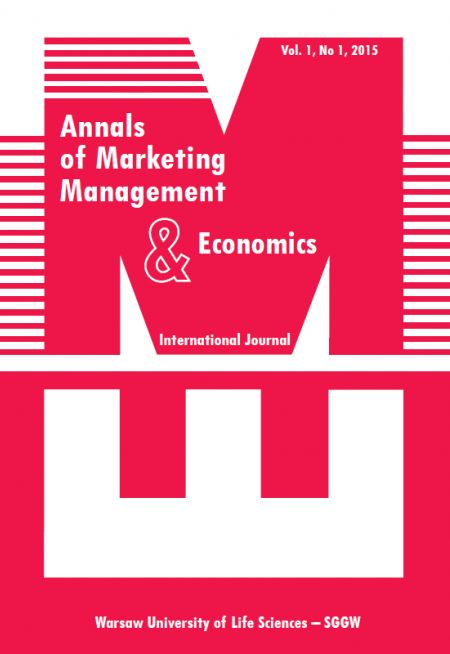Main Article Content
Article Details
Buti M., 2011. Balancing Imbalances: Improving Economic Governance in the EU after the Crisis, CESifo Forum, ISSN 2190-717X, 12(2, 3-11).
Cárdenas M., Urrutia M., 1995. Macroeconomic Instability and Social Progress. In Reform, Recovery, and Growth: Latin America and the Middle East, University of Chicago Press, 79-114.
Cli, 2018. Civil liberties index. The Freedom House, retrieved from https://freedomhouse.org/report-ypes/freedom-world [accessed: 31.03.2018].
EF, 2018. Index of economic freedom. The Heritage Foundation, retrieved from https://www.heritage. org/index/ [accessed: 31.03.2018].
GHI, 2017. Global Hunger Index. The International Food Policy Research Institute (IFPRI), retrieved from http://www.ifpri.org/publication/concept-global-hunger-index-1 [accessed: 31.03.2018].
GII, 2017. Global innovation index. Cornell University, INSEAD, and the World Intellectual Property Organization, retrieved from https://www.globalinnovationindex.org/analysis-indicator [accessed: 31.03.2018].
HDR, 2016. Human Development Report. United Nations Development Program retrieved from: http://hdr.undp.org/en/content/human-development-index-hdi [accessed: 31.03.2018].
Hurduzeu G., Lazar M.I., 2015. An assessment of economic stability under the new European economic governance. Management Dynamics in the Knowledge Economy, 3(2), 301.
Ionita R.O., 2015. The Evolution Of The Macroeconomic Stabilisation Pentagon In Romania, Czech Republic And Hungary. The Annals of the University of Oradea, 25(1), 733-741.
IPRI, 2017. The International Property Rights Index. DC-based Property Rights Alliance (PRA), retrieved from https://www.internationalpropertyrightsindex.org/full-report [accessed: 31.03.2018].
Iqbal N., Nawaz S., 2010. Fiscal Decentralization and Macroeconomic Stability Theory and Evidence from Pakistan, Paper present at 26th AGM and Conference, Islamabad, Pakistan, Pakistan Institute of Development Economics.
Kuc M., 2015. The use of Markov chains in the social convergence analysis. The 9th Professor Aleksander Zelias International Conference on Modelling and Forecasting of Socio-Economic Phenomena, Foundation of the Cracow University of Economics, 118-126.
Martinez-Vazquez J., Mcnab R., 2006. Fiscal Decentralization, Macrostability, and Growth, "Economics Faculty Publications" 179 (4, 2006), 25-49.
Melnyk L., Sineviciene L., Lyulyov O., Pimonenko T., Dehtyarova I., 2018. Fiscal decentralization and macroeconomic stability: the experience of Ukraine's economy. Problems and Perspectives in Management, 16(1), 105-114. (Crossref)
LPI, 2017. The Legatum Prosperity Index. Legatum Institute, retrieved from http://www.prosperity. com/rankings [accessed: 31.03.2018].
Lyulyov O., Shvindina H., 2017. Stabilization pentagon model: application in the management at macro- and micro-levels. Problems and Perspectives in Management, 15(3), 42-52. (Crossref)
PFI, 2017. Press Freedom Index. Reporters Without Borders (RSF), retrieved from https://rsf.org/en/detailed-methodology [accessed: 31.03.2018].
Popa A.M., 2012. The impact of social factors on economic growth: Empirical evidence for Romania and European Union Countries, Romanian Journal of Fiscal Policy 3, 2, 1-16.
Ravn M.O., Uhlig H., 2002. On adjusting the Hodrick-Prescott filter for the frequency of observations. Review of economics and statistics 84(2), 371-376. (Crossref)
Santos A.D., Ribeiro S., Castela G., Da Silva N.T., 2017. The Dynamics between Economic Growth and Living Standards in EU Countries: A STATICO Approach for the Period 2006-2014. Estudios de economía aplicada 35(3), 629-652. (Crossref)
Solans E.D., 2002. Macroeconomic stability and growth in the European Monetary Union. Speech delivered at The Economist Conference: Portugal and the European Union, Lisbon, 16 December 2002, retrieved from https://www.ecb.europa.eu/press/key/date/2002/html/sp021216.en.html [accessed: 31.03.2018].
Soukiazis E., 2000. Are living standards converging in the EU? Empirical evidence from time series analysis. CEUNEUROP Working Papers, Discussion Paper Nº3, March, retrieved from http://www4.fe.uc. pt/ceue/working_papers/iliving.pdf [accessed: 31.03.2018].
Zhylins'ka O., 2017: Ukrayina 2030: Doktryna zbalansovanoho rozvytku (Ukraine 2030: Doctrine of the balanced development) [in Ukrainian], Kalvariya, Lviv.
World Bank, 2017. World Development Indicators, World Bank, retrieved from https://data.worldbank. org/indicator [accessed: 31.03.2018].
Żuchowska D., 2013. Assessment of the Central and Eastern Europe Economies in the Years 2007-2010 Based on the Model of the Macroeconomic Stabilization Pentagon. Equilibrium. "Quarterly Journal of Economics and Economic Policy" 8(4), 49-64. (Crossref)
Downloads

This work is licensed under a Creative Commons Attribution 4.0 International License.





